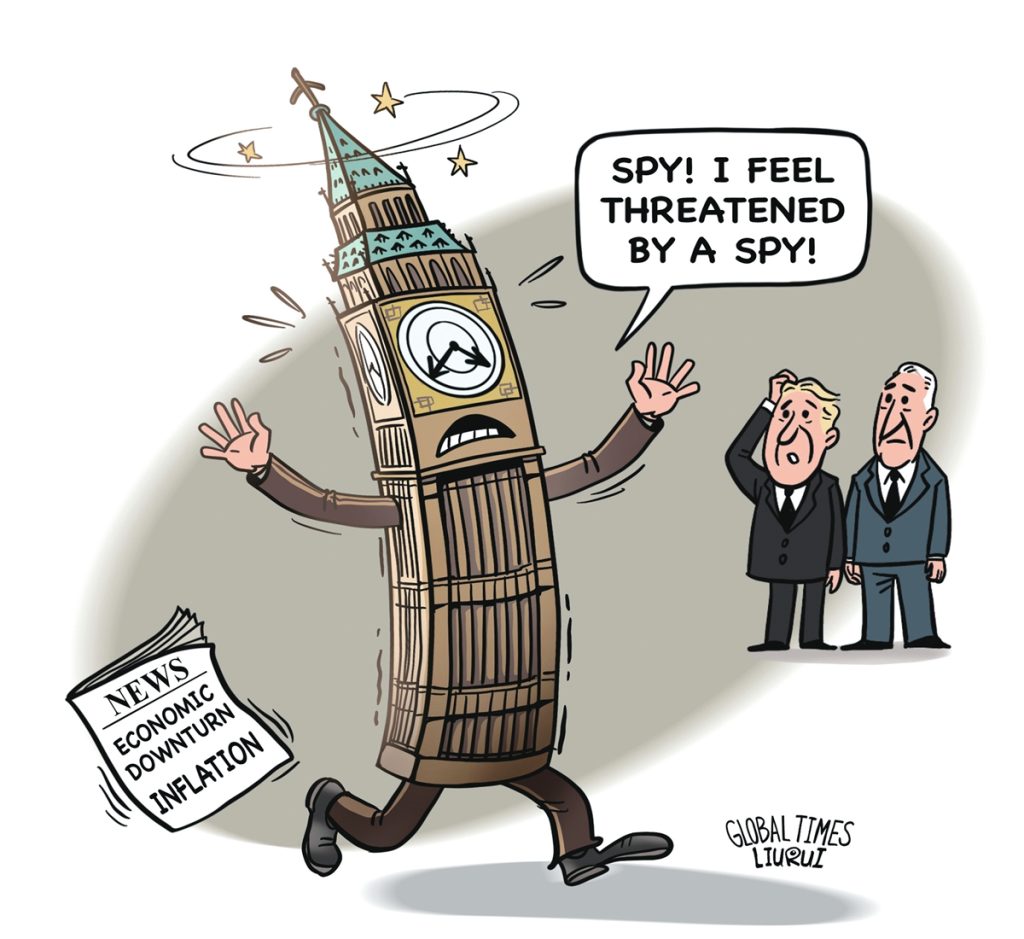Hyped media reports of ‘spy’ exacerbate anti-China hate

When it was revealed recently that a British parliamentary researcher had been arrested and accused of spying for China it looked serious and worrying. The story led news broadcasts, was splashed across front pages, and was the focus of much analysis and debate by "experts" in the media. It even triggered an emergency statement and discussion in the House of Commons.
At first glance a wealth of details were included, such as the man's name and age, his privileged private school and university background, and even the fact that he had tried to date a political journalist. Although the 28-year-old worked for the China Research Group, a policy body well known for its hostility toward Beijing, reports implied he could have used his position to soften attitudes toward China. Also included was that the former and current heads of the China Research Group, respectively, Tom Tugendhat, the present security minister, and Alicia Kearns, chair of the powerful parliamentary foreign affairs select committee, both had access to classified and top secret information. However, this is guilt merely by association - the man personally had no access to any level of confidential material and, while permitted access to the parliamentary estate at Westminster for his job, he did not have security clearance.
Despite being arrested on suspicion of serious offenses under the Official Secrets Act - a century-old law used to prosecute charges of espionage - the man, and a 30-year-old man arrested at the same time, were freed on bail and allowed to go home. That was six months ago. They do not have to report back to the police until next month. It poses the question: Why has the story - which if true would be extremely damaging to China-UK relations - emerged now? Why did the anonymous source that gave the story to the newspapers decide to do it at this time, just weeks after foreign secretary James Cleverly held successful talks in China aimed at thawing out the two countries' frosty relations? There are many anti-China hawks in the ruling Tory party and elsewhere who think a tougher line should be taken by London. Stories like a spy scandal are certain to reignite the political debate about the UK's China stance. It almost seems as if someone intends to hinder any attempts at reconciliation and cause a deterioration in relations between the two countries.
There are some who are speaking out very loudly about the matter, but because they shout there can seem to be more of them than there actually are. Even the occasionally animated debate on the issue in the House of Commons on Monday afternoon was attended by only a few dozen of the chamber's 650 Members of Parliament. Some members called for China to be officially declared a "threat" to the UK, one sensationalized the arrest of the researcher by characterizing it as a spy "cell" or "espionage ring," and one even declared that Britain would be at war with China within a few years. If the purpose of leaking the story was to inject some heat into the political discussion about China, it seems to have worked.
Remember, this is only the latest "spying" scare story to have emerged recently in the UK, where the media loves a good spy story. Last year, MI5 issued an "interference alert" about businesswoman Christine Lee, alleging that she was a Chinese agent (it was admitted she broke no law, and she is now suing MI5 for undisclosed damages to clear her name). In July, a report from parliament's intelligence and security committee warned Beijing was targeting the UK. Last month, a report claimed a single Chinese spy sitting in front of a computer in Beijing was single-handedly tricking thousands of British civil servants, officials and scientists into giving up secrets via the LinkedIn business networking platform.
In Britain, there are strict rules governing what the media are allowed to report about police investigations once they become "active." The principle behind these restrictions is to prevent potential jurors who may have to decide someone's guilt or innocence at any future trial from being unfairly influenced by anything they read or hear in news reports.
Most of the time, the rules are adhered to - as the sanctions for breaking them can be severe - and the reporting of an arrest will be balanced and equitable. Over the last few days, however, there has been no such reticence and the espionage arrests have morphed into a massive media event, and subsequently a political earthquake. Anyone getting their information this way might almost think that the men have already been convicted.
In a statement through his lawyers, the man has criticized the "misreporting" and "extravagant news reporting" of his arrest. Will it transpire that hyped media reports have done nothing but feed China hate?